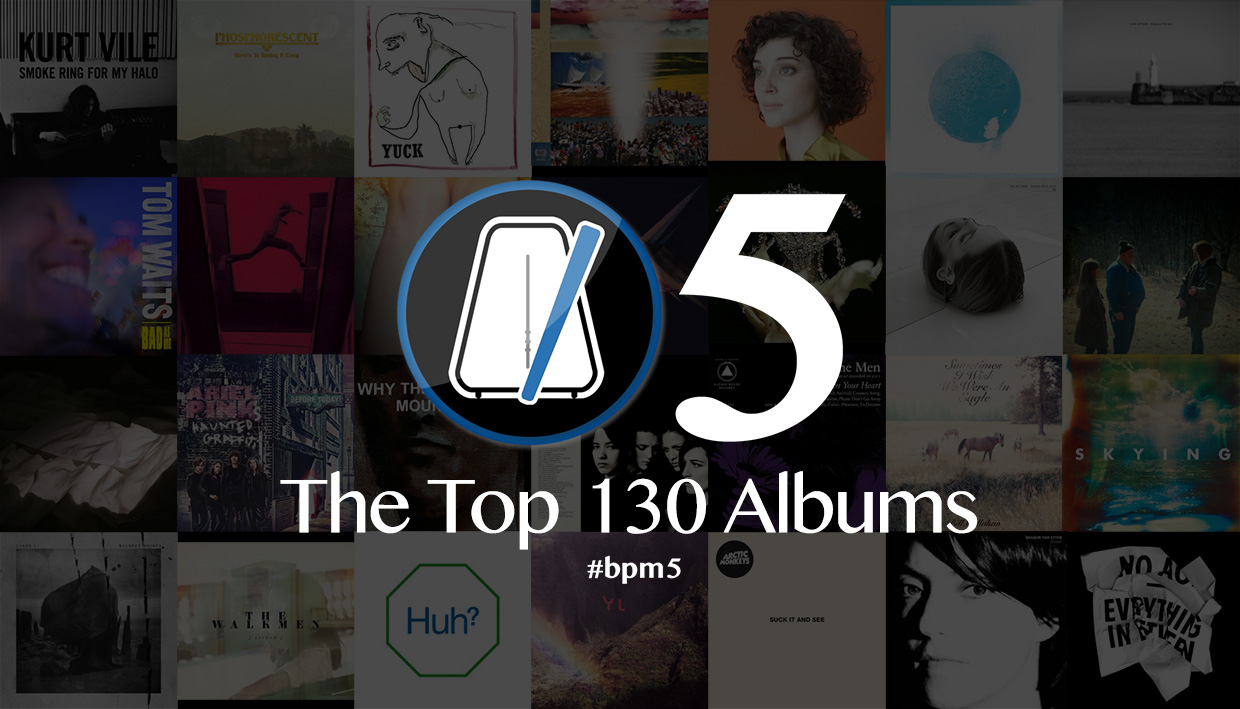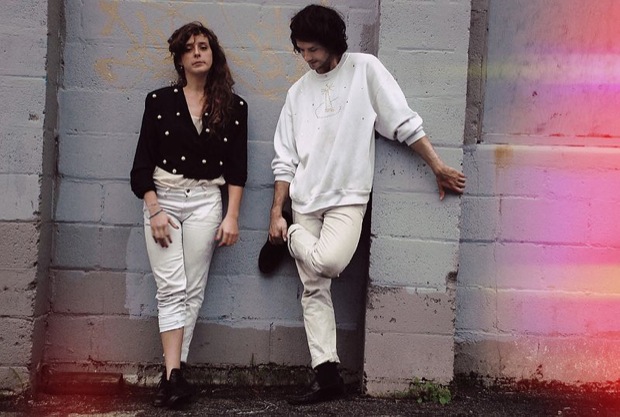
20. Beach House – Teen Dream
[Sub Pop; 2010]
At the risk of sounding hyperbolic, this is perhaps the most beautiful album I’ve ever heard. Victoria Legrand’s keyboards have never sounded quite so plaintive; Alex Scally’s guitar has never shimmered quite so iridescently. Moreover, it’s here that Legrand’s vocal ability really comes into its own, a booming, sonorous instrument that imbues lines like “It can’t be gone; we’re still right here” with immeasurable shades of longing and regret.
And the songs! The songs on Teen Dream are unpretentious and confident, resplendent and heartbreaking. There’s something poignant about those little tinny drum machines that provide the backbone for these richly evolving pieces; they add a relatable, lo-fi heartbeat to otherwise soaring tracks like “Zebra,” “Walk in the Park,” and “Take Care.” Meanwhile, Beach House expand their horizons with the shoegazing crescendo of “10 Mile Stereo” and the tense, found-sound linearity of “Real Love,” proving that they can retain their signature sound without growing redundant or complacent. Fragile hearts may break easily, but they also tend to tell lovely little stories; Teen Dream’s got ten of them, and they never get old.
– Josh Becker
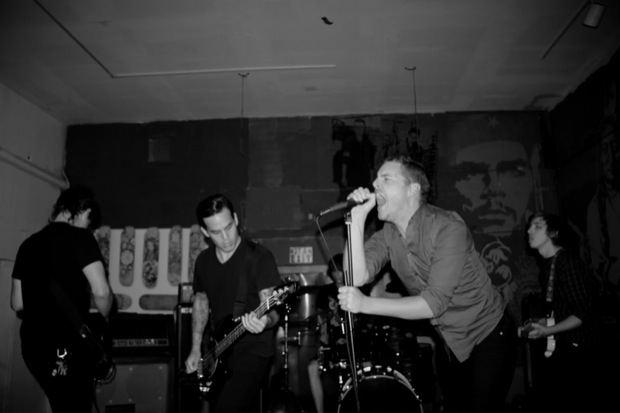
19. Deafheaven – Sunbather
[Deathwish; 2013]
I’ve never listened to a Godspeed You! Black Emperor album in full. Hold on, down your weapons. Despite digging plenty of charred post-rock now, I immediately blacklisted Lift Yr Skinny Fists after a perplexing encounter with a shitty Limewire rip when a wee lad, and felt no inclination to begin on ‘Allelujah! Don’t Bend! Ascend! last year. So this right here, this hulking pink beast, is revelatory. Not that the San Franciscan brawlers are a direct descendent of Godspeed, mind. The feeling I get from Sunbather is akin to listening to Yank Crime for the first time with little precedent and feeling my jaw unhinge. The body blows Deafheaven land feel every bit as vital, and in spite of their tinnitus-invoking intensity, you deliriously will them forward during the gorgeous moments of serenity. It’s hard to avoid the usual tropes when writing about this sort of music: every breakdown feels like a breakthrough, sunlight breaking through the clouds, cracking the sky. Those interludes break up the tumult — break, break, break — which could tip the wrong side of bludgeoning stretched over the 65m runtime. But you imagine even were it nothing more than hammerblows from beginning to end, Deafheaven would still pull it off with panache.
Given that even the weariest of bearded men who exit the tab over at the slightest mention of “soaring” or “crescendo” are losing their shit, it seems I’m not the only one overcome with pie-eyed wonderment, affirming that this is truly something special. Even the vocals are buried deep enough that only the occasional howl or growl rises, sinking the sticking point that puts most off quote unquote black metal (which, as my esteemed colleague noted last week, this DEFINITELY ISN’T (it sorta is)). Were you to tally it up, you’d find that Deafheaven scored the highest placing album and song of 2013 on our lists – to put that in context, the next heaviest thing to make a dent would be The Seer at #10 last year. That’s pretty indicative. It’s killer shit and you’d be wise to step outside your comfort zone and embrace it with arms wide open. Shouts going out to Creed, on that note – your boys took one hell of a beating.
– Gabriel Szatan

18. St. Vincent – Strange Mercy
[4AD; 2011]
The third album from St. Vincent, Strange Mercy, marks a bit of a departure. This is seen as early as the album’s cover art, which features a mouth gasping for air through some suffocating white latex. It’s an almost sinister image of fraught with danger, desperation but also striking beauty – a theme repeated throughout this unforgettable album.
Throughout the record, St. Vincent’s (real name Annie Clark) demur delivery belies devious lyrics, and her sweet songs subvert the idea of the sound of pop music. For example the catchy “Cruel” sounds radio-friendly until you hear lyrics like “They could take or leave you/ So they took you, and they left you.” Add in Clark’s dissonant guitar and you have further complicated the dynamic.
“Cheerleader” is the title for a peppy number, but the tone is decidedly dour. ”I don’t want to be a cheerleader no more,” she sings over distorted drums and distressing rhythms, ultimately resolving into resolute defiance. On the double-edged “Surgeon,” she opens with almost helpless listlessness: “I spent the summer on my back. Above the tide. Staying just to get along.” But the heartbeat-bass and sea-like synths pick up and soon she’s repeatedly begging for the “best, finest surgeon” to “come cut me open.”
Back to the cover. See, St. Vincent’s first two covers feature Clark almost wide-eyed with innocence and porcelain-like delicacy. This time, the cover is intense, personal and close to the subject. She is no longer floating above her topics or over-embellishing melodies. She’s no longer “acting” or asking for someone to “marry her.” This time she’s in it, unmistakably pushing her teeth through the record – and ultimately deep into your memory. It’s a noticeable change for Clark, and in this case, change is very good.
– Brian Hodge
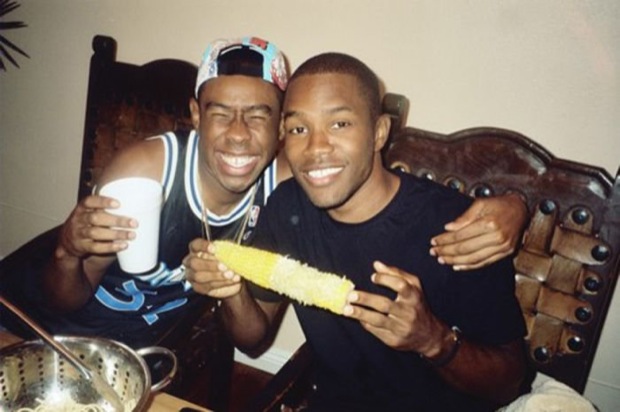
17. Frank Ocean – Channel Orange
[Def Jam; 2012]
Well isn’t this refreshing? An album of old-fashioned R&B and soul in the vein of Stevie Wonder, filtered through the electronic post-post-modernism of a generation that posts its coming out letters to Tumblr. Many of the songs on Channel Orange have that rare quality of sounding immediately timeless, the kind of stuff roadside diners would have on their jukeboxes in 40 or so years (if diner jukeboxes weren’t a sadly obsolete technology). “Thinkin Bout You” kicks things off with an unexpectedly tender ballad that may have been written for someone else but more than gets its message across thanks to Frank’s pitch-perfect falsetto; “Sweet Life” and “Super Rich Kids” are classic slices of soul for the west-coast trust-fund set; “Pilot Jones” offers a bit of woozy minimalism before the hard-knock-life lessons of “Crack Rock” and the multipart “Pyramids.” By the time you get to the moving confessional of “Bad Religion” and the eerie emptiness of “Pink Matter,” you’ve run through a gamut of emotions and styles, all equally handled by the capable and impossibly suave member of Odd Future who proves that class and sensitivity can be more attractive than even the most viral of profanity-laden mixtapes. One of these days, I want to dance to this album at somebody’s Bar Mitzvah.
– Josh Becker

16. Tame Impala – Lonerism
[Modular Recordings; 2012]
Do you know how hard it is not to listen to this record all the time; like, all the time? Are you aware of how incessantly distracting these songs can be when trying to get through other material, or not lose a train of thought when writing? Have you any idea the number of times I’ve woken up with “Mind Mischief” running circles around my brain, gargled “Feels Like We Only Go Backwards” in the shower or hummed the bass part to “Keep On Lying” on public transport? Got even a base level appreciation of how bizarre humming a bassline in an alternative rock song even is in the present day? Is it apparent how, one year removed, the stature of this album continues to grow exponentially? Does it not scare you how easy they make it look? Ever considered that they might have a better one in them yet? Or two? Or three? Do you realise how fucking great Lonerism is? Do you realise how fucking great this band is?
– Gabriel Szatan

15. The National – High Violet
[4AD; 2010]
The three years it took to create The National’s fifth album was a tense and arduous journey, and the work that went into it is arguably clearer than ever. On the preceding Boxer, they furrowed deeper into the fading city lights, revealing a depraved human element to cosmopolitan living while caught somewhere between the big leagues and the suburbs; on 2013’s Trouble Will Find Me, they sound more at ease with what they’re creating, lead singer Matt Berninger sounding comfortable with his inner doubts. High Violet was the peak between the two, and could easily be considered the band’s best record to date. Berninger sounds fraught with emotional tension, struggling to live every or any day easily: “It takes me a day to remember a day/ I didn’t mean to let it get so far out of hand,” he confesses on “Lemonworld,” while on “Conversation 16” he’s teetering on a breakdown as life insists on going on regardless as he “[tries] to hold it together ’til our friends are gone.” The specific work Berninger put into his vocal melodies shows, as there are about a hundred different phrases from High Violet that sink into your head: his slow-building drawl on “Runaway” is inspired and wistful; when he confesses “I don’t have the drugs to work this out” on “Afraid of Everyone” he manages one of his best hooks while sounding like he’s genuinely trying to make a plea to anyone listening; and “Sorrow” sinks in immediately as he confesses the possible root of all his work: “Sorrow found me when I was young/ Sorrow waited, Sorrow won.”
High Violet isn’t just Berninger’s show, though, as it also has the rest of the band widening up. Aaron Dessner’s piano chords on “England” are evocative of a time and place we can easily imagine, even if we’ve never seen the rainy streets of London while he manages to make a bookending and consuming guitar scrawl sound perfectly normal on “Little Faith.” Padma Newsome’s graceful and slyly empowering horns and woodwind section on “Bloodbuzz Ohio” bring grace to a Berninger’s contrasting lyrics about the vacuous of sentimentality. Even the syrupy strings on closing number “Vanderlyle Crybaby Geeks” carry on the caffeinated weariness the album is held with until the final moments. And the guests make their mark, too, all without drawing attention to themselves; it’s easy to miss the fact that Nico Muhly, Richard Reed Perry, and Justin Vernon spread across the album (though Sufjan Stevens’ ethereal vocal arrangements on “Afraid of Everyone” are pretty distinctive once you catch onto their presence). High Violet is a testament to the fact that even when tensions are high, stress is an everyday occurrence, and the expectations of a huge following are resting on you (all just like in everyday life, as is expressed on the album both lyrically and musically), an expert and astounding work can still be produced.
– Ray Finlayson

14. Fever Ray – Fever Ray
[Rabid; 2009]
It’s hard not to view Karin Dreijer Andersson’s eponymous debut as Fever Ray through the lens of her other project The Knife’s masterful 2006 album, Silent Shout. Fever Ray shares a few strands of DNA with the previous record, seemingly existing along the same chilly, isolated Scandinavian landscapes as Silent Shout. But Fever Ray is a quieter affair and somehow more internal and personal. Silent Shout‘s tendency toward the dance floor is exchanged for a roomier, more contemplative atmosphere, Andersson’s interest in mysticism, womanhood, and primal emotions sprawling across a backdrop of spare production and lush atmospherics. Silent Shout will forever be the “important” record in Andersson’s back catalogue, but Fever Ray is an intimate look into the Norwegian artist’s internal world.
– Will Ryan

13. Bon Iver – Bon Iver, Bon Iver
[Jagjaguwar; 2011]
On the one hand, Bon Iver is an album that will always be thought of or referred to as “the follow-up to that album.” But on the other hand, it’s such a singular piece in itself, it completely washes away the image of a man having a stand off with a raven that has stolen his keys. On his highly anticipated follow up, Justin Vernon walked away from creating songs (or just finding inspiration) with a guitar in hand, and instead reached out and melded with his bandmates to create something resembling a watercolour in progress, a series of vivid memories, or a tapestry of relaxed thoughts after years of travelling. Bon Iver beautifully matches big gestures to tiny ones, like the marching force of Colin Stetson’s saxophone on “Perth” to the sound of a shimmering bicycle bell on “Michicant,” and in between creates a vivid picture of a poetic mind pouring out seamlessly. Vernon plays around with phrasing, but still captures poignancy perfectly (“I could see for miles, miles, miles,” goes the most memorable example from “Holocene”); his words can be jagged and loose but amidst the surroundings of pedal steel guitars and ’80s keyboards, it all comes together. Despite what Vernon sings on “Holocene,” he was (and still is) magnificent.
– Ray Finlayson
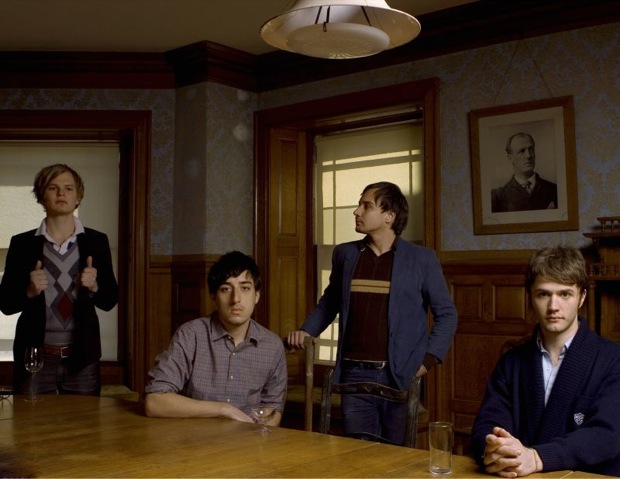
12. Grizzly Bear – Veckatimest
[Warp; 2009]
Veckatimest is named after Veckatimest Island, one of the Elizabeth Islands in Dukes County, Massachusetts. The 17-acre island is uninhabited. I learned this after my initial listen of Grizzly Bear’s Veckatimest and instantly declared that the title was an ill fit. How could you title such a lively album after an island that is, well, lifeless?
Instead of brashly getting its point across, Grizzly Bear values elegance over aggression. These songs are intricately constructed and dutifully performed, as if the band is hesitant to disturb its own fragile creations. But deep, searching listens reveal nothing close to fragility, but rather airy constructions with deceptively solid foundations – songs that exist regardless of their performers and independent of their listeners. Veckatimest is a a quivering, constantly on-the-cusp exercise in tasteful restraint, but it’s remarkably affecting in surprisingly visceral ways. Whether it’s the casual lope of “Two Weeks,” the uneasy march of “Cheerleader,” the glacial stateliness of “Foreground,” or the quietly burning intensity of “While You Wait For The Others,” it pulls you in all directions. The tension, however, is never overwhelming or unpleasant – it’s rather like the conflicting feeling of being alone in an uninhabited place: lonely, peaceful, and worrying all at once. Perhaps the title isn’t so ill-fitting after all.
– Andrew Ryce
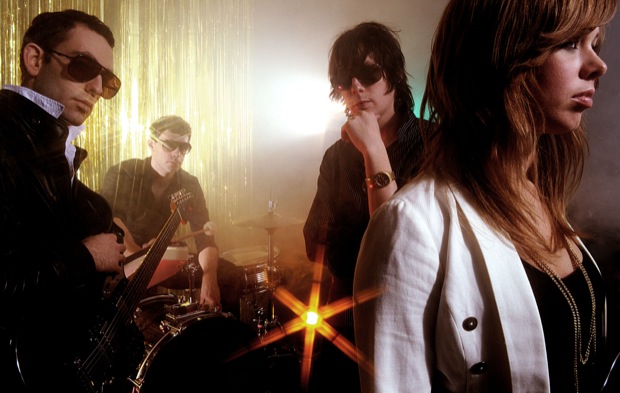
11. Chromatics – Kill For Love
[Italians Do It Better; 2012]
In calling their 2007 debut LP Night Drive, Chromatics made a statement of intent. This is nocturnal music, meant to be played in the bleary haze of the post-midnight hours as you’re driving down empty roads with blurring lights. It was mood music, pure and simple, but it would be another few years before they’d capitalize on that sound and turn it into something thrilling and dramatic on the whole. It should come as no surprise that promo posters for the band’s 2012 effort Kill For Love posited the record as a film rather than a piece of music. This is a band with an eye for drama, and a record that’s more perfectly plotted than anything that any of their contemporaries have been doing. Using a cover of Neil Young’s “Hey Hey, My My” as an epigraph of sorts, Kill For Love is a sprawling double LP, impressive and intimidating in its scale. There’s pop songs here, just as there were on Night Drive, but take them as part of the scenery, one of many sides of this totemic work to be absorbed. Turn yourself over, the same way you would strapping down for the newest work from your favorite auteur. Prep yourself for the 92 minute thrill ride.
– Colin Joyce

